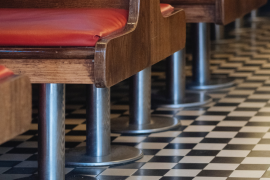THE BOXES KEEP COMING. Long, casket-shaped cardboard leaning on the front steps. Palm-sized squares in the mailbox. Brown rectangles sprouting on the walkway. Shannon is never sure when they will arrive; there are too many. She pulls back the curtain, bumps the tip of her nose on the cold glass. She stops on her way to the bathroom and stands on her tip-toes, peering out the high square windows of her front door. Then, just when she believes nothing will come today, she takes out the trash and there they are, waiting in the driveway like children.
Some of the stuff she needs. New running shoes. Coconut-scented leave-in conditioner. Water filters for the refrigerator. Other stuff she orders with a mixture of rebelliousness and guilt: a seventy-five-dollar coffee thermos. A heated towel rack. An exercise bike that costs nearly two-months rent. What she used to pay in rent, before she bought the house. Her father told her renting was stupid. Wasted money. You’re paying someone else’s mortgage, Shan. But sending a check each month to the bank didn’t feel any different than mailing one to her landlord. Money was just numbers and percentages and acronyms on an electronic paystub. Every other Friday her phone told her that thousands had been deposited into her account, yet she felt richer on those late-night walks to her apartment after closing the restaurant, pockets full of cash. Or as a girl, that King Tut bank she had, how when she opened the little door on his back, crumpled fives and ones coughed out onto her bed. She’d scoop her hands under the pile and toss them into the air, like she’d seen people do in movies.
You’ve earned it.
Her mantra. She whispers it as she drags the black arrow over the BUY NOW button. The arrow becomes a white gloved hand, the pointer finger and thumb extended. Cocked. Three little cartoonish creases on the back of the hand that somehow make it look friendly.
You’ve earned it.
No longer hushed encouragement, but a verdict.
__
The empty boxes pile in the basement. When Shannon goes down to do laundry, she kicks a path to the washing machine, the cardboard scraping along the cement floor. That hollow grinding reminds her of the peanut shells from the restaurant. It was the kind of place that let customers toss the shells on the floor. Old men and college kids seemed to enjoy it. Once in a while, when she told people where she worked, they’d say, “Oh, that peanut place?” The owner talked about it with pride, telling everyone, especially the newest, youngest waitress, that it was all about “branding.” At first, Shannon found it kitschy, like places that bring you baskets of popcorn as soon as you sit down or let kids step on a giant scale and pay a penny a pound. But after a few nights of closing, of sweeping up mealy, blackened shells, the charm wore off, as if the dining room were littered with dead beetles. Once, buried in a pile in the back corner, she found a used condom.
Shannon fills the washer, adds detergent, hits start. Not today, maybe tomorrow, she’ll prop open the bulkhead doors and drag the boxes out into the backyard. She’ll hold as many as she can and carry them over to the fire pit at the far corner of her property. Each trip, she’ll pick up the ones that fumbled out of her arms, grab a few more, and carry them out. This method is inefficient, but it’s the way she’s always done it and is now an integral part of the process. All this time at home has made her acutely aware of how, for most of her life, she’s equated frantic inefficiency with productivity. Work faster. Crazier. Perhaps that’s why she saves the box burning for after particularly stressful mornings, after her face is flushed from too much coffee, too much forced-air heat in the guest room/office. After her eyes ache at the edges from staring too long at the screen. After her body has extracted every calorie from the dry toast she ate six hours earlier. After, after, after – she’ll put on her coat and gloves, slip the kitchen lighter into her pocket, and head outside.
The washer begins its cycle. Shannon’s daydreams fill with smoke.
__
Compulsive nostalgia. Shannon and her therapist settle on it together. A sensation triggers a memory. More than a memory. A relived experience. A slipping of time. A blackout. Sautéing garlic teleports her to her grandmother’s basement apartment, the little black frying pan, the red power light on her hot plate. The rush of cars on the highway just beyond her yard drops her into the back seat of her father’s orange Nova, clutching her King Tut keychain, streetlights flying over her like UFOs. Or the biting vibration of slicing open a cardboard box, that cutting and peeling and tearing like a bolt of Christmas through her brain.
She tries to stop the memories. She does yoga. Meditates. Takes up sewing. Nothing. The pathways of her mind are carved and polished, slick as a cave. Each new hobby, each recommended remedy faces a maze, must tremble toward blind corners only to be sucked into one of the pathways and lost forever. Her mind is efficient. Experienced. And it believes that the work it is doing is good.
But the burning. The burning does something. She tries to explain it to her therapist without sounding crazier. It’s something about the smoke, the way the flames and smoke sort of curl around each other. I get scared for a second because I think I put too many in at once and that it’ll spread to the grass or the fence or the trees. Sometimes I smell the hair burning on my forearm. And then when it’s done all that bulky cardboard is soft and fluffy like snow. I can’t be the only one who finds burning cathartic, can I?
When her therapist said “pyromania,” Shannon laughed. Who is she, Beavis now? Some little boy burning ants in a driveway? Grown women are not pyros. But when she read the symptoms, the words felt surprisingly intimate, like a horoscope.
- Purposefully sets fires on more than one occasion.
Sure, who hasn’t?
- Experiences tension before setting fires and a release after.
Yes…
- Derives pleasure from setting or seeing fires.
Well, yes.
Couldn’t someone who loves camping read that and self-diagnose? Yes, they could, her therapist said. But it’s all about context. What else is going on in the person’s life? Why is this behavior occurring? What purpose does the person believe it is serving?
They talk by phone. Shannon’s choice, to give her eyes a break from the screen. Sometimes she’s engaged in the discussion, other times she holds the phone in one hand, and scrolls through her shopping cart. Eighty-seven items. $6,757.43. She’s proud of herself for using the ADD TO CART button, instead of BUY NOW, BUY NOW, BUY NOW. Tiny square photos and a brief description, each item like a dating app profile. Or a mugshot. She can choose to DELETE, SAVE FOR LATER, or COMPARE WITH SIMILAR ITEMS, but she never does. Scrolling through her cart has replaced flipping through her high school yearbook. A glimpse into who she was months, weeks, days ago. Her past desires, aspirations, fears. Our sense of time has changed, her therapist said. Just our sense, Shannon wondered? Not time itself? A high-speed blender. A bamboo oil diffuser. A WiFi booster. Clues. Reminders. Memories. Her therapist’s voice is underwater.
You are in control of your choices.
Shannon checks out.
__
Her father wished to be cremated. At least, that’s what her sister Lydia said. Shannon never heard him talk about it or saw it written anywhere, but Lydia said it so many times that Shannon began to believe it. Dad’s wishes. The road to hell is paved in euphemisms, and when someone dies, Death fills our mouths with obscurities. Sorry for your loss, passed on, in a better place. But “wishes” struck Shannon as particularly disturbing. As if Death were a genie in a lamp, and her father, weary and wind-swept, kneeling on the hospital floor, had only minutes to choose. And for my last wish, please, please burn my body.
Absurd. But what does one wish for at the end of a life? Money and happiness are obsolete. Perhaps hopes for an afterlife? Did her father “see God” before he died? Did he “find” him? Would it make any difference if he had?
His was a textbook cancer case. Nothing rare or unexpected. Decades of smoking. A stubborn cough. A reluctant visit to the doctor. Scans, biopsies, diagnosis. Each time she called he told her he was feeling better. Each time she visited he had lost more weight. His face gaunt, his arms two sticks draped in skin. The whole thing so predictable, so inevitable, which made it all the more painful. Like driving toward a cliff at ten miles per hour.
When she was a child, she loved hearing him tell stories of ancient Egypt. Pyramids and gilded sarcophagi and gods in the sun – how could such a place have ever existed? King Tut took the throne at eight years old, just one year older than Shannon, and she liked to imagine herself climbing a golden staircase, her terrycloth bathrobe a linen tunic, her toothbrush a jeweled scepter. Her father brought home illustrated encyclopedias from the library, detailed, full-color drawings of battles, cross-sections of the Great Sphinx, step-by-step diagrams of the mummification process. They fell asleep on the couch to droning documentaries on the History Channel. They wrote out an itinerary for a trip they’d never take, a fantasy like Shannon’s letters to Santa that included photos of trampolines and electric guitars and playhouses carefully cut from circulars and catalogs. But of all the things about Egypt her father taught her, she was fascinated with their death rituals, the way they purified the body with palm wine and water from the Nile. How they removed the brain through the nose, discarded it because they believed it was useless. The idea that the person would not need their brain in the afterlife confused her as a child but made sense to her now.
What she remembered most, what she could see, what she could almost touch when she closed her eyes, were the tombs filled with gold and jade treasures, amulets and jewelry, onyx statues, and ornamental weapons made from precious metals. She’d lay on her mattress, studying the cracks and water stains in her ceiling and pretend her room was made of gold.
A skilled archeologist might find evidence of Shannon’s past fascination with ancient Egypt. Why someone in the future might be digging through her online shopping history is irrelevant. Some items on her “Wish List” seem intentional, others arbitrary. A $35,000 “Beatles Memorabilia Case with DNA” – a lock of John Lennon’s hair pressed between glass. A $28 make-up bag. A $1,000 gold scarab necklace. The list is long, and she’s comforted by the thought that when she dies, there will be no confusion. Her final wishes sorted and waiting.
__
This morning was a marathon. Six to noon, stopping only to pee. The kind of morning she used to love when the office was open – a chance to shut her door and write – but now made her claustrophobic, her silent house humming and creaking. She used to lose herself in the confident optimism of a well-written grant. How open and generous the world seemed when displayed in a proposal narrative and organized by subheadings: Significance, Work Plan, Outcomes and Reporting. The budget at the end a gleaming pot of gold. All she had to do was write the rainbow.
They once held fundraisers and benefits, big ballroom galas with stages and massive crystal chandeliers. Once, Eddie Vedder and his wife Jill came and spoke about epidermolysis bullosa, a rare genetic disorder that causes the skin to tear apart, blister, and sheer off. It was hard not to compare the couples’ smooth, tan complexions with the slideshow of photos behind them, children with their heads and torsos wrapped in gauze like burn victims. During the event, Shannon was energized and inspired, chatting with donors from around the state, trying to contain herself during dinner when Eddie fucking Vedder peeled open a half-melted butter packet and used the gold foil to spread it on his roll. But all that giddiness and possibility has devolved into long, silent mornings in her make-shift home office, her grant nothing but a poor girl’s letter to Santa.
She stands and stretches. Blood rushes to her feet. Her vision narrows, the brief wooziness a sudden, fast-moving storm through her brain. The bright window becomes a tunnel, then slowly opens, opens. Her vision expands. The blood catches up to her body.
Downstairs she eats lunch—leftover tuna salad and crackers—standing at the kitchen table, gazing out through the sliding glass doors. Snow had fallen days ago. The temperature rose slightly, a misty rain in the afternoon, and then plummeted again and hasn’t risen above ten degrees in several days. She stares at one of her credit card bills on the counter for a long time. The letters and numbers morph into rows of mysterious symbols.
The green firepit was her first housewarming present. A gift from her father. When she opened it, she gave him a curious smile. Without missing a beat, he told her a home isn’t a home without a fireplace. This’ll hold you over until we put in a chimney. She knew this was his way of saying he was proud of her, proud that she worked nights and doubles on weekends to pay her way through college, when that was still possible. What she studied didn’t matter to him, as long as she got “that piece of paper.” He was of the generation that believed college degrees were minted on the same machine as Willy Wonka’s golden tickets. Maybe they once were. Still, she was proud of herself, proud of his pride, and each night he visited, they sat around the fire pit until the red tip of his cigarette seemed to move by itself in the darkness.
For a while, she felt rich. But as the world shut down, when the office closed, as he grew sicker and the nurses told her it was no longer safe to visit, her senses dulled. Everything in her house, her furniture, her clothes, her own body became intangible. Flimsy. Paychecks and bills—what was the difference? No one would inherit her debt. You can’t take it with you, her father always said. Maybe that’s why she’s thinking so much about ancient Egypt lately—they believed the opposite. You can take it all with you. You have to. Who knows what you’ll need in the afterlife?
She chews her last bite leaning over the sink, walks downstairs and steps into her boots. When she opens the bulkhead doors, the freezing air whistles in her face. Shannon slips the red kitchen lighter—half gun, half sword—into her hip pocket. The boxes thump as she gathers them in her arms, their splayed tops bumping into the basement support pole, then scraping along the cement wall as she walks up into the backyard.
She steps slowly across the ice. Her boots don’t break through, and she’s not sure if the ice is thick or she’s lost more weight. When she reaches the gentle slope behind her garage, her boots glide for a moment, a giant white conveyer belt carrying her toward the pit. She doesn’t jerk or try to stop herself. Her legs and shoulders relax, and for a few seconds, the ground guides her.
The escalator at the mall. The rainbow sequins on her untied shoes catching the florescent light. Her father’s hand, a tan, callused mitt, reaching down like a giant stretching through clouds. Gasoline and cigarette cologne. The steps of the escalator sink and slip through metal teeth. He pulls her up just in time, her laces dangling. Then the dollar store, a prize to calm her down, a little gold plastic pyramid with enough room inside to hold a coin or a note.
She lifts the metal cover of the fire pit and leans it against the side. Only three of the large rectangular boxes fit at once. Shannon props them against each other, face down. She balls up a piece of paper packing material, twisting one of the corners into a fuse, and slides it under the boxes.
Shannon clicks the lighter. Her phone rings, but she ignores it. The red line moves up the fuse. Smoke seeps out the sides, slow at first, then streams like water rushing from a faucet. Flames curl around the flaps. A hard gust of wind, the fire groans, and Shannon thinks it’s gone out, but the flame rages back, twisting up the seams. Her phone rings again and this time she digs it out of her coat pocket. LYDIA-HOME glows across the screen.
“Shan? You there? Where are you, outside?”
The smoke rushes and rolls. Big steam train clouds, yellowing from the burning tape.
“Yes.”
A box caves and tips and the flames divide, find new channels, dart and stab and pulse.
“No one’s heard from you. Are you OK?”
She throws another box on. Then another.
“Shan?”
They shed their layers, blackened and glowing, impossibly light, floating up like leaves reclaimed by the trees.
“Have you given any thought to Dad’s wishes?”
ANTHONY D’ARIES is the author of The Language of Men: A Memoir (Hudson Whitman Press, 2012), which received the PEN Discovery Prize and Foreword’s Memoir-of-the-Year Award. His work has appeared in McSweeney’s, Boston Magazine, Solstice, The Good Men Project, Shelf Awareness, The Literary Review, Flash Fiction Magazine, and elsewhere. He currently directs the low-residency MFA in Creative and Professional Writing at Western Connecticut State University.
Like what you’re reading?
Get new stories or poetry sent to your inbox. Drop your email below to start >>>
OR grab a print issue
Stories, poems and essays in a beautifully designed magazine you can hold in your hands.
GO TO ISSUESNEW book release
China Blue by Catherine Gammon. Order the book of which William Lychack Jeffries calls “a fiery declaration of all that is inexpressible about desire and loss and the need to find a home in a world in which even the most solid and real of things feel often less than completely solid or real.”
GET THE BOOK



